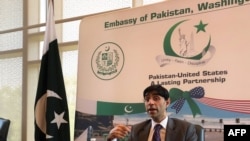Pakistan is echoing warnings from Washington that neither the Afghan government nor the Taliban can get what they want if they insist on pushing ahead with military campaigns instead of working to reach an agreement through negotiations.
Fighting between government forces and Taliban fighters has surged in recent weeks, with the August 31 deadline for the U.S. military withdrawal from Afghanistan drawing ever closer, prompting U.S. forces to increase the number of airstrikes in support of the Afghan military.
Yet Pakistan’s national security adviser, in Washington for meetings with U.S. officials, said Thursday that a military victory for the Afghan government or the Taliban is simply not realistic.
'No forceful takeover'
"It is not possible for either side to get what they want on the battlefield," Moeed Yusuf told a virtual audience at the U.S. Institute for Peace. “A compromise is inevitable.”
“The messaging on the ground has to be perfectly clear that we will go to any extent needed to patch this conversation up among Afghans to bring it to its logical conclusion, which is to end violence. No forceful takeover," he said.
Yusuf said Pakistan has agreed to work with the United States to help the Afghan government and the Taliban end their hostilities, adding that continued fighting is not in Islamabad’s interest. He called peace in Afghanistan “nonnegotiable.”
“Protracted conflict in Afghanistan undermines Pakistan's transformed vision for itself, which is a paradigm focused on geoeconomics,” he said. "How can we tell the investors of the world who are interested in Pakistan that there is a place that's very unstable next to us, but don't worry, that doesn't affect the region?”
When pressed on whether Pakistan could do more to pressure the Taliban to accept a negotiated settlement, Yusef said Pakistani officials can only do so much.
“When the troops withdraw, the leverage decreases. When the Taliban make gains on the battlefield, logically, the leverage decreases," he said.
U.S. officials have long implored Pakistan to do more to influence the Taliban, going as far as to suspend security assistance in 2018.
Talks stepped up
Talks between U.S. and Pakistani officials, though, have increased in recent months. Many of those conversations have focused on Afghanistan, with both countries expressing concern about the country’s trajectory.
General Mark Milley, chairman of the Joint Chiefs of Staff, warned last month that the Taliban appeared to have seized “strategic momentum” as their fighters gained control of about half of Afghanistan’s district centers.
A more recent report, by the U.S. Defense Department’s inspector general, described the situation in Afghanistan as bleak and warned that the Afghan government was facing an “existential crisis” because of the gains by Taliban forces.
Still, U.S. officials have insisted repeatedly that a Taliban victory is not a “foregone conclusion.”
As the U.S. withdrawal has progressed, however, officials have also warned that officials in Kabul should be wary of relying on military force.
"The [Afghan] government cannot get rid of the Taliban,” U.S. Special Representative for Afghanistan Reconciliation Zalmay Khalilzad told VOA earlier this week. “And the Taliban cannot conquer Afghanistan and have a government … that has the support of the overwhelming majority of the Afghans."
Ayaz Gul contributed to this report from Islamabad.








